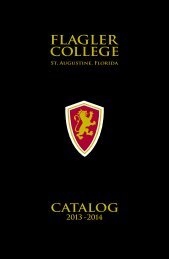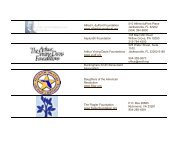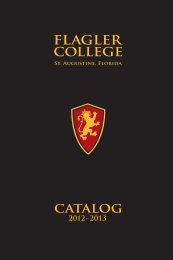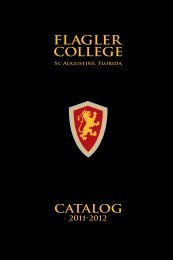Disability Documentation - LD - Flagler College
Disability Documentation - LD - Flagler College
Disability Documentation - LD - Flagler College
You also want an ePaper? Increase the reach of your titles
YUMPU automatically turns print PDFs into web optimized ePapers that Google loves.
1<br />
<strong>Flagler</strong> <strong>College</strong><br />
Office of Services for Students with Disabilities (OSSD)<br />
Registering and Applying for Accommodations<br />
Eligibility for services at <strong>Flagler</strong> <strong>College</strong> is based on current laws which govern postsecondary<br />
education, the Americans with Disabilities Act (ADA) and Section 504 of the Rehabilitation Act<br />
of 1973. These laws prohibit discrimination on the basis of disability and allow for certain<br />
protections and rights of equal access to all college programs and services for which a student<br />
is otherwise qualified.<br />
Students at <strong>Flagler</strong> <strong>College</strong> must provide the Office of Services for Students with<br />
Disabilities with documents that establish a physical or mental impairment/<br />
disability that substantially limits a major life activity and must comply with the<br />
established procedures before accommodations can begin.<br />
In order to provide equitable academic adjustments and accommodations to students seeking<br />
services at <strong>Flagler</strong> <strong>College</strong>, the Office of Services for Students with Disabilities (OSSD) requires<br />
students to:<br />
1. present appropriate documentation (see documentation requirements below)<br />
2. meet with the Coordinator or her designee (see contact information below)<br />
3. comply with the established accommodation procedures<br />
Retroactive accommodations are not allowable at <strong>Flagler</strong> <strong>College</strong>. Thus, it is imperative for<br />
students to establish their eligibility for accommodations before or early in the semester and to<br />
follow through with the services available to them. OSSD does not compel students to access<br />
services; they must take the initiative.<br />
<strong>Documentation</strong> Requirements<br />
1. <strong>Documentation</strong> Requirements for Students with Learning Disabilities:<br />
<strong>Documentation</strong> will be reviewed and reasonable accommodations will be determined on an<br />
individual basis by the Office of Services for Students with Disabilities and the Office of<br />
Academic Affairs. A student is not considered to be qualified for accommodations based on the<br />
presence of a disability alone or even on the history of previous academic accommodations<br />
(such as an IEP or a 504 plan); it must be clearly documented that the current condition<br />
significantly impacts the student in a major life activity, including learning.<br />
Based on standards from the Association of Higher Education and <strong>Disability</strong> and on best<br />
practices, documentation acceptable to <strong>Flagler</strong> <strong>College</strong> must comply with the following:<br />
‣ Reports must be current and professional. <strong>Documentation</strong> is intended to represent the<br />
student’s current levels and the current impact of the disability on academic,<br />
psychological or physical functioning. This must be age-appropriate and if found to be<br />
outdated, more current information will be required. All reports should be typewritten in<br />
English and delivered on letterhead with all contact information available. In most cases,<br />
documentation must be done within the past 1 – 3 years.<br />
‣ Evaluations must be conducted and reports written by a Qualified Professional.<br />
Every assessment/report must be completed by a trained and qualified (i.e. certified/<br />
licensed) professional. All applicable licensure information must be available upon<br />
request. All qualified professionals must have training and/or experience with adolescents
2<br />
<strong>Flagler</strong> <strong>College</strong><br />
Office of Services for Students with Disabilities (OSSD)<br />
and adults and have training specific to the diagnosed disability. They should not be<br />
family members.<br />
Examples of qualified professionals for Learning Disabilities:<br />
Psychologist<br />
School psychologist<br />
<br />
<br />
Neuropsychologist<br />
Educational diagnostician or student clinicians who are being supervised by a qualified<br />
professional<br />
‣ <strong>Documentation</strong> must include a specific diagnosis. Reports must definitely state the<br />
disability (DSM diagnosis when appropriate) and its significant limitation to the academic<br />
environment. Phrases such as “learning difficulty, appears, suggests, etc.” do not indicate<br />
a conclusive diagnosis. The documentation must state the diagnosis clearly and<br />
specifically.<br />
‣ <strong>Documentation</strong> must be comprehensive and include:<br />
1. A summary of all relevant historical and medical information.<br />
2. A history of presenting symptoms<br />
3. A summary of applicable diagnostic tools<br />
4. Information about specific functional limitations<br />
5. List of all medications and side effects that might impact the student in<br />
a college environment<br />
*Note: An elementary/secondary plan or a handwritten note does not meet these standards<br />
Learning <strong>Disability</strong> <strong>Documentation</strong> must contain all test scores and sub test scores (standard<br />
scores, percentiles and grade equivalent) of comprehensive instruments for aptitude,<br />
achievement and information processing.<br />
*See Addendum A.<br />
‣ <strong>Documentation</strong> must include recommendations for accommodations as they directly<br />
relate to the functional limitation. A prior history of an accommodation, without a<br />
demonstration of a current need, does not in and of itself warrant the provision of a like<br />
accommodation at <strong>Flagler</strong> <strong>College</strong>. Each accommodation recommended by an evaluator<br />
should include a rationale. The evaluation should support the recommendations with specific<br />
test results or clinical observations. If an accommodation is not clearly identified in the<br />
diagnostic report, <strong>Flagler</strong> <strong>College</strong> will seek clarification and, if necessary, more information<br />
and will make the final determination as to whether appropriate and reasonable<br />
accommodations are warranted and can be provided. <strong>Flagler</strong> <strong>College</strong> reserves the right to<br />
request reassessment when questions regarding previous assessment or previous service<br />
provision arise.<br />
‣ Meet with the Coordinator or her Designee: Contact the Office of Services for Students<br />
with Disabilities at 904.819.6460 or e-mail at OSSD@flagler.edu to schedule an<br />
appointment. At that time, the student will meet individually with the Director of <strong>Disability</strong><br />
Services in L211 to review documentation, discuss academic goals, request<br />
accommodations, review the procedures for approved accommodations and outline<br />
expectations on the student's behalf.
3<br />
<strong>Flagler</strong> <strong>College</strong><br />
Office of Services for Students with Disabilities (OSSD)<br />
*Addendum A: Measures Used in Adult Assessment of Learning Disabilities<br />
This is not a complete list of all acceptable instruments; it is offered as a standard of acceptable<br />
measures. If there are measures in question which are not on the above list, please contact this office for<br />
clarification.<br />
Acceptable Aptitude Measures:<br />
Wechsler Adult Intelligence Scale-3rd Edition (WAIS-III)<br />
Wechsler Adult Intelligence Scale-Revised (WAIS-R)<br />
Stanford Binet Intelligence Scale-4th and 5th Edition (SB IV, V)<br />
Woodcock-Johnson Psychoeducational Battery-3rd Edition: Tests of Cognitive Ability<br />
Woodcock-Johnson Psychoeducational Battery-Revised: Tests of Cognitive Ability<br />
Kaufman Adolescent and Adult Intelligence Test<br />
Non-acceptable Aptitude Measures:<br />
Brief screening instruments or instruments inappropriate for college students are not acceptable.<br />
Examples:Kaufman Brief Intelligence Test (KBIT)<br />
Slosson Intelligence Test<br />
Wechsler Abbreviated Scale of Intelligence (WASI)<br />
Wechsler Intelligence Scale for Children – III (WISC-III)<br />
Acceptable Achievement Measures:<br />
Wechsler Individual Achievement Tests II (WIAT II)<br />
Wechsler Individual Achievement Test (WIAT)<br />
Woodcock-Johnson Psychoeducational Battery-3rd Edition: Tests of Achievement (WJ-III)<br />
Woodcock-Johnson Psychoeducational Battery-Revised: Tests of Achievement (WJ-R)<br />
Stanford Test of Academic Skills (TASK)<br />
Scholastic Abilities Test for Adults (SATA)<br />
Note: Screening tools such as the Wide Range Achievement Test (WRAT-III) are not considered<br />
comprehensive measures of achievement and must be accompanied by a comprehensive measure such<br />
as one of those listed above. All instruments selected to measure these areas must be age- appropriate.<br />
Information Processing<br />
a. Subtests of the WAIS-R or WAIS-III<br />
b. Subtests of the Woodcock-Johnson Psychoeducational Battery: Tests of Cognitive Ability<br />
c. Wechsler Memory Scales-Revised or 3rd Edition


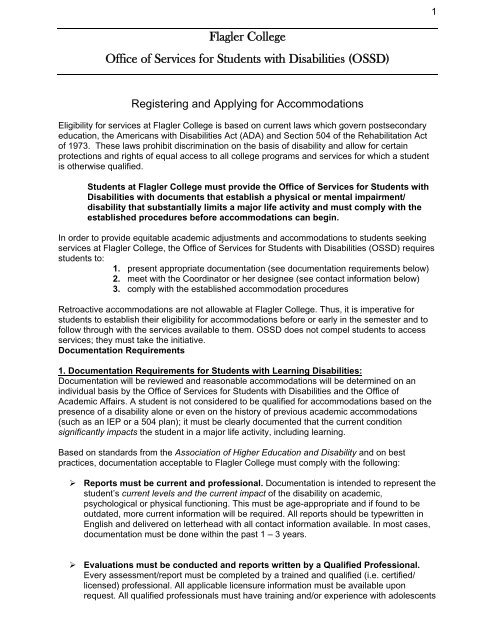
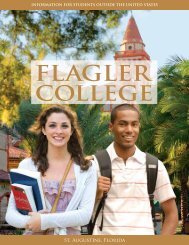
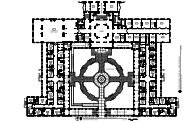
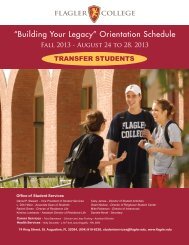
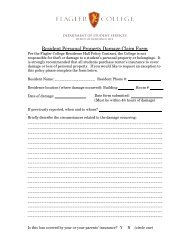
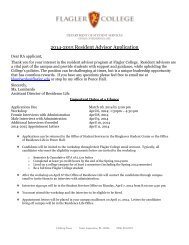
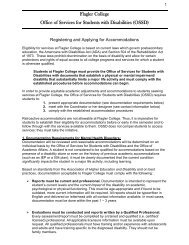
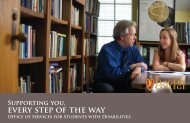
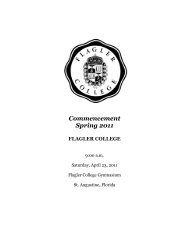
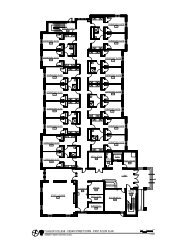
![staffpershandbook 2011[1] - Flagler College](https://img.yumpu.com/38077847/1/190x245/staffpershandbook-20111-flagler-college.jpg?quality=85)
